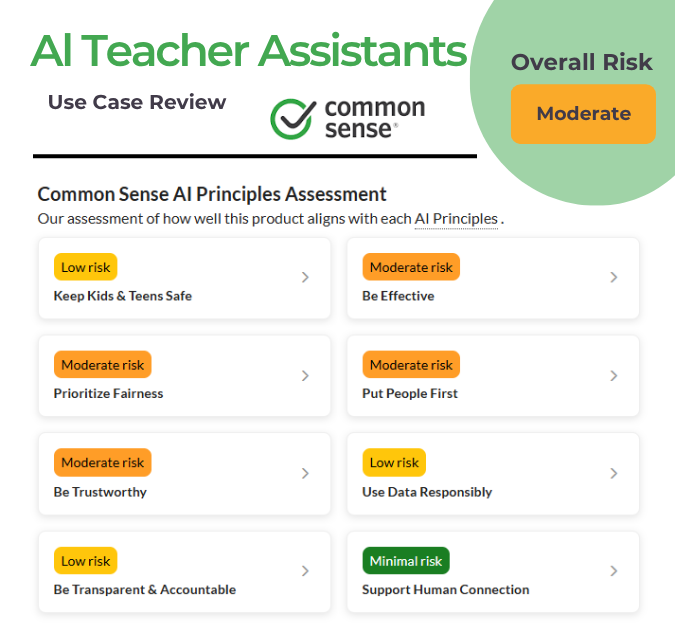Risk Assessment for AI Teacher Assistants
Common Sense Media recently released a comprehensive risk assessment of AI teacher assistants/lesson planning tools. Their findings reveal that while these tools promise increased productivity and creative support, they're also creating "invisible influencers" that could fundamentally undermine educational quality.
Unlike GenAI foundation model chatbots, these tools are specifically designed for instructional planning and classroom use and are rapidly being adopted across districts.
Key Concerns from their report:
"Invisible Influencers" in Student Learning: AI-generated content directly shapes what students learn through potentially biased perspectives and historical inaccuracies that teachers may miss; evidence also shows these tools suggest different approaches and responses based on student race/gender
“Outsourced Thinking" Problem: Tools make it dangerously easy to push unreviewed AI instructional content straight to classrooms, while novice teachers lack experience to spot subtle errors and biasses
High-Stakes Outputs: IEP and behavior plan generators create official-looking documents that could impact student educational trajectories even though these plans should be human-generated (and in the case of IEP goals are mandated to be human generated)
Undermining High-Quality Instructional Materials: Without proper integration, these tools fragment learning and can undermine coherent, research-backed curricula
Recommendations from the report:
Experienced educator oversight required for all AI-generated educational content
Clear district policies and guidelines for AI teacher assistant implementation
Integration with existing high-quality curricula rather than replacement of established materials
Robust teacher training on identifying bias and evaluating AI outputs
Careful oversight of real-time AI feedback tools that interact directly with students
We'd also recommend foundational AI literacy for teachers before they begin using GenAI teacher assistants, so that they are aware of the potential limitations.
While AI teacher assistants aren't inherently problematic, they require the same careful implementation and oversight we'd expect for any tool that directly impacts student learning. The potential for enhanced productivity is real, but so are the risks to educational equity and quality.
This report underscores the urgent need for GenAI EdTech tool makers to provide evidence of how their tools mitigate these issues along with evidence-based policies and professional development to help educators navigate AI tools responsibly. All of which underline how important AI Literacy is for the 2025-2026 school year.
Check out the full report.
Also check out our 5 Questions to Ask GenAI EdTech Providers resource if you are planning to implement any of these tools in your school or district.

